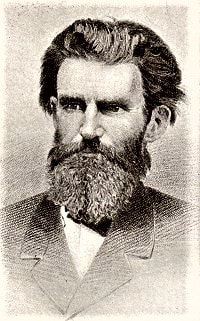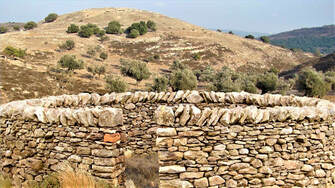Photo Copyright: hydromet
"For God did not send the Son into the world to judge the world, but that the world might be saved through Him." (John 3:17)
"The thief comes only to steal and kill and destroy; I came that they may have life, and have it abundantly." (John 10:10) "For the Son of Man has come to seek and to save that which was lost." (Luke 19:10)
This lesson explains 11 biblical reasons why Jesus Christ came into the world. Ten of these reasons are in the words of Jesus himself.
Consider. If an unbeliever or an inquisitive new believer were to ask you, "Why did Jesus come into the world?," what would you say?
1. Jesus Came to Fulfill the Law and the Prophets
Early in his ministry, it was important for Jesus to establish why he came (Ref. 1). Jesus said to his hearers, "Do not think that I came to abolish the Law or the Prophets; I did not come to abolish but to fulfill" (Matthew 5:17). To Jesus, the scriptures were absolutely authoritative (Luke 24:44). Jesus came to cause God's will in the law (the first five books of the Old Testament) to be obeyed as it should be. Jesus also came to fulfill the prophecies and promises in the writings of the prophets, Psalms, and the other books of the Old Testament (Thayer's Greek Lexicon - Ref. 2).
2. Jesus Came to Save the World
Jesus spoke the following famous words in John 3:16, "For God so loved the world, that He gave His only begotten Son, that whoever believes in Him shall not perish, but have eternal life." Then Jesus continued the thought in John 3:17. "For God did not send the Son into the world to judge the world, but that the world might be saved through Him" (John 3:17). The Greek word for saved is sózó (pronounced sode'-zo) and means deliver out of danger and into safety; used principally of God rescuing believers from the penalty and power of sin – and into His provisions (safety) (Ref. 3). Because God in love sent his Son to save the world, Jesus has already delivered you and me -- all those who believe in him -- out of danger into his safety.
3. Jesus Came into the World to Save Sinners
The Apostle Paul wrote, "It is a trustworthy statement, deserving full acceptance, that Christ Jesus came into the world to save sinners, among whom I am foremost of all" (1 Timothy 1:15). Sinners are hamartólos -- people who "fall short of what God approves, i.e. what is 'wide of the mark'" (Ref. 4). That category, "sinners," actually includes all of us -- "for all have sinned and fall short of the glory of God" (Romans 3:23).
4. Jesus Came to Preach the Kingdom of God
When Jesus went out from Capernum to a solitary place (Luke 4:31, Luke 4:42), he told the multitudes who were searching for him, "I must preach the kingdom of God to the other cities also, for I was sent for this purpose" (Luke 4:43). Jesus also used the same word for preach when he quoted Isaiah 61:1 -- "The Spirit of the Lord is upon Me, Because He anointed Me to preach the gospel to the poor" (Luke 4:18). In Luke 4:18 and Luke 4:43, the Greek word for preach is euaggelizó (pronounced yoo-ang-ghel-id'-zo) which means to "proclaim the good news" (Ref. 5).
5. Jesus Came Down from Heaven to Do the Father's Will
Jesus said to the people, "All that the Father gives Me will come to Me, and the one who comes to Me I will certainly not cast out. For I have come down from heaven, not to do My own will, but the will of Him who sent Me" (John 6:37-38).
In John 6:40, Jesus explained what the will of his Father was in sending him. "For this is the will of My Father, that everyone who beholds the Son and believes in Him will have eternal life, and I Myself will raise him up on the last day." It is the Father's will that everyone who believes in his Son may have eternal life. If you would like to read more about eternal life, please see "What Is Eternal Life?" (Ref. 6) 6. Jesus Came into this World so that Those Who Do Not See May See
In John 9:1-12 Jesus healed the sight of a man who had been blind from birth. The formerly blind man testified to the Pharisees about Jesus, but they refused to "see" and believe in Jesus (John 9:13-34). The Pharisees then put the formerly blind man out of the synagogue (John 9:22, John 9:34). After the formerly blind man had been put out of the synagogue, Jesus found him, and the man who could now see physically and spiritually worshiped Jesus as Lord (John 9:35-38). Jesus then said in the presence of the Pharisees, "For judgment I came into this world, so that those who do not see may see, and that those who see may become blind" (John 9:39).
7. Jesus Came that We May Have Life and Have it Abundantly
In John 10:8-10 Jesus said, "All who came before Me are thieves and robbers, but the sheep did not hear them. I am the door; if anyone enters through Me, he will be saved, and will go in and out and find pasture. The thief comes only to steal and kill and destroy; I came that they may have life, and have it abundantly." The Greek word for abundantly is perissos (pronounced per-is-sos') and means all-around, beyond what is anticipated, exceeding expectation, "more than enough" (Ref. 7). In the words of the Amplified Bible, Jesus said, "The thief comes only in order to steal and kill and destroy. I came that they may have and enjoy life, and have it in abundance [to the full, till it overflows]" (John 10:10 AMP).
8. Jesus Came to Serve and to Give His Life as a Ransom for Many
Jesus said about himself, "The Son of Man did not come to be served, but to serve, and to give His life a ransom for many" (Matthew 20:28). When Jesus said he came to serve, the word in the Greek text is diakoneó which means to minister and to care for the needs of others, for example, as a slave waiting on table for guests (Ref. 8). When Jesus said that he came to give his life as a ransom for many, the word in the Greek text for ransom is lutron (pronounced loo'-tron) which was the price to free a slave (Ref. 9). The ransom price that Jesus paid to free us from slavery to sin was his blood (1 Peter 1:18-19, Hebrews 9:11-12).
9. Jesus Came to Seek and Save that which Was Lost
Notice in Luke 19:1-2 that Zaccheus was a tax gatherer, a person despised by the Jews and the religious leaders of Jesus' day. Yet, God gave Zaccheus the desire to see Jesus (Luke 19:3-4). Jesus extended his grace to Zaccheus and said he wanted to stay at Zaccheus' home (Luke 19:5). Zaccheus indicated his conversion, his turning away from sin when he stated that he would repay anyone he had defrauded (Luke 19:8). Jesus then said, "Today salvation has come to this house, because he, too, is a son of Abraham. For the Son of Man has come to seek and to save that which was lost" (Luke 19:9-10).
The Greek word for lost, apollumi (pronounced ap-ol'-loo-mee), has a severe meaning, and we need to pay attention. Apollumi (being lost) implies to die with the implication of ruin and permanent (absolute) destruction by experiencing a miserable end (HELPS Word-studies - Ref. 10). "Jesus Christ came to save Zaccheus, you, and me from experiencing ruin, permanent destruction, and a miserable end" (Ref. 11). For further study on the nature of God to seek and save the lost, read the parables of The Lost Sheep, The Lost Coin, and The Prodigal Son in Luke 15:1-32. 10. Jesus Came as Light into the World
Jesus said, "I have come as Light into the world, so that everyone who believes in Me will not remain in darkness" (John 12:46). Jesus came as light into the world so that everyone who believes in (has faith in, trusts in - Ref. 12) him shall not remain in (abide in, stay in - Ref. 13) darkness (moral and spiritual obscurity which blocks the light of God when faith is lacking - Ref. 14). Without Christ, man is in darkness. When we believe in Christ, God transfers us from the domain of darkness to the kingdom of His Son (Colossians 1:13).
11. Jesus Came into the World to Bear Witness to the Truth
Early in the morning on the day he was to be crucified, Jesus stood before Pilate. Pilate said to him, "So you are a king?" (John 18:37). Jesus answered, "You say that I am a king. For this purpose I was born and for this purpose I have come into the world—to bear witness to the truth. Everyone who is of the truth listens to my voice" (John 18:37). The Greek noun for truth, alétheia, means reality — the opposite of what is false or illusion (HELPS Word-studies - Ref. 15). Jesus came to testify, to be a witness to us about the reality of God's truth. Listen to his voice. He is the Truth (John 14:6).
Prayer. Thank you, Jesus, for coming into the world to save sinners, including me (1 Timothy 1:15). Help me to share the truth of your word with others so they, too, will trust in you as their Savior and Lord.
Related Lessons
"Biblical Definition of the World" (John 1:10) "What is Eternal Life?" (John 17:3) "What is Redemption?" (Ephesians 1:7) "What Does 'To Be Saved' Mean in the New Testament?" (Acts 16:31) "Jesus - Witness to the Truth" (John 18:37)
References
1. https://biblehub.com/commentaries/barnes/matthew/5.htm 2. https://biblehub.com/greek/4137.htm 3. https://biblehub.com/greek/4982.htm 4. https://biblehub.com/greek/268.htm 5. https://biblehub.com/greek/2097.htm 6. https://www.scriptureway.com/home/what-is-eternal-life 7. https://biblehub.com/greek/4053.htm 8. https://biblehub.com/greek/1247.htm 9. https://biblehub.com/greek/3083.htm 10. https://biblehub.com/greek/622.htm 11. https://www.scriptureway.com/home/what-does-to-be-saved-mean-in-the-new-testament 12. https://biblehub.com/greek/4100.htm 13. https://biblehub.com/greek/3306.htm 14. https://biblehub.com/greek/4653.htm 15. https://biblehub.com/greek/225.htm
3 Comments
"In him we have redemption through his blood, the forgiveness of our trespasses, according to the riches of his grace ..." (Ephesians 1:7)
This lesson explains the biblical definition of redemption, that Jesus Christ has paid the price for our redemption, and that our redemption is a free gift from God.
Consider. Think for a moment. How would you define redemption in your own words? How would you explain your redemption through Christ to an inquisitive unbeliever or a new Christian?
1. Redemption is the action of buying back or repurchasing what was previously forfeited or lost.
The transliteration of the Greek word for redemption in Ephesians 1:7 is apolutrosis (ap-ol-oo'-tro-sis) (Ref. 1). HELPS Word-studies states that apolutrosis (redemption) literally means buying back from, repurchasing what was previously forfeited (or lost) (Ref. 1). Jesus said, "For the Son of Man came to seek and to save the lost" (Luke 19:10).
In the New Testament, the primary idea in redemption is deliverance from bondage, specifically the bondage of sin (John 8:34-36, Ref. 2). "Into that bondage man has plunged himself; God’s mercy redeems him from it at an unspeakable price" (John 3:16, 1 Peter 1:17-19, Ref. 2). 2. Redemption is effected by the payment of ransom. Jesus Christ has paid the ransom price -- his blood -- for our redemption.
The Strong's Concordance definition of apolutrosis (redemption) is a release effected by payment of ransom (Ref. 1). The transliteration of the Greek word for ransom is lutron (loo'-tron), which literally is the ransom money (price) to free a slave (Ref. 3, HELPS Word-studies). Jesus Christ has paid the lutron, the ultimate "liberty price" -- the blood of Christ -- to purchase (ransom) believers, freeing them (us) from all slavery (bondage) to sin (Ref. 3). Jesus said, "For even the Son of Man came not to be served but to serve, and to give his life as a ransom for many" (Mark 10:45).
Consider these cross references: 1 Peter 1:18-19 -- "Know that you were redeemed from your empty way of life inherited from the fathers, not with perishable things like silver or gold, 19 but with the precious blood of Christ, like that of a lamb without defect or blemish." Hebrews 9:11-12 -- "But when Christ appeared as a high priest of the good things having come, He entered through the greater and more perfect tabernacle, not made by hands, that is, not of this creation; 12 and not through the blood of goats and calves, but through His own blood, He entered the holy place once for all time, having obtained eternal redemption." 3. According to Ephesians 1:7, we (believers in Christ) have redemption through the blood of Christ and the forgiveness of our trespasses according to the riches of God's grace.
Strong's Concordance defines grace as a gift or blessing brought to man by Jesus Christ (Ref. 4). Thus, our redemption by Jesus Christ is a free gift from God to us, believers in Christ, according to the riches [abundance] of God's grace (Ephesians 1:7, Ref. 5).
Even though God's grace-full gift of redemption to us was free, that free gift of redemption was immensely costly to God (John 3:16, 1 Peter 1:18-19). Summary - the Main Principles in this Lesson:
1. Redemption is the action of buying back or repurchasing what was previously forfeited or lost.
2. Redemption is effected by payment of ransom. Jesus Christ has paid the ransom price -- his blood -- for our redemption. 3. We (believers in Christ) have redemption through the precious blood of Christ and the forgiveness of our trespasses according to the riches of God's grace. Redemption is a free gift from God to us. 4. Although our redemption by God is a free gift from God to us, that free gift was immensely costly to God -- it cost the precious blood of God's only Son, Jesus Christ.
Apply. How will you purpose to live today and each day in light of your redemption by Jesus Christ, God's Son? Give thanks for God's gracious gift of redemption.
"The Lord is my shepherd; I shall not want. He makes me lie down in green pastures. He leads me beside still waters. He restores my soul. He leads me in paths of righteousness for his name's sake." (Psalm 23:1-3) "I am the good shepherd." (John 10:11, 14) This article describes the author background and then the scripture allusions for verse 1 of the hymn, "Savior, Like a Shepherd Lead Us." This article is the first in a series on this theologically-rich children's hymn. Reference 2 describes the scripture allusions in verse 2 of "Savior, Like a Shepherd Lead Us." Hymn Text Author Researchers do not know for sure the circumstances about how the text for "Savior, Like a Shepherd Lead Us" was written; however, researchers attribute this beloved hymn of the Christian faith to Englishwoman Dorothy Ann Thrupp (1779-1847) (Ref. 3, Ref. 4). Miss Thrupp is "particularly remembered as a writer of hymns for children" (Ref. 4). "Savior, Like a Shepherd Lead Us" first appeared unsigned (unattributed) in her collection, Hymns for the Young, in 1836 (Ref. 4). Ms. Thrupp wrote this hymn for teaching young children the message of a "caring Christ who loves all his children" (Ref. 3).  William B. Bradbury (Ref. 6) William B. Bradbury (Ref. 6) Hymn Tune Composer William Batchelder Bradbury (1816-1868) was an American musician who composed the tune in 1859 most often associated with "Savior, Like a Shepherd Lead Us" (Ref. 3, Ref. 5 below, Ref. 6). He named the tune "Bradbury" after himself (Ref. 3, Ref. 5). Mr. Bradbury "modified the original words meant for children and broadened the meaning to include all the congregation" (Ref. 3). Mr. Bradbury also composed the tunes to many popular hymns including "Jesus Loves Me," "He Leadeth Me," and "My Hope is Built" (Ref. 6). In addition to being an excellent musician and composer, Mr. Bradbury served as a music educator, choir leader, organist, and was a devoted reader of the Bible (Ref. 7, Ref. 8). All of the Bible verses below are linked to the BibleGateway.com website (Ref. 9). The verses below are quoted from the English Standard Version (ESV) unless noted otherwise. To see the lyric sheet for all four verses of "Savior, Like a Shepherd Lead Us" on one page, click here. The lyrics are provided by Timeless Truths (Ref. 10). Scripture Allusions - Verse 1 The first verse of this great hymn teaches children that Christ is our great Shepherd who leads us, cares for us, feeds us, and protects us. The verse also explains that Christ has redeemed us and that we are his possession. "Savior, like a shepherd lead us, much we need Thy tender care" The Lord is our Shepherd who leads us and cares for us. Psalm 23:1-3 -- "The Lord is my shepherd; I shall not want. (2) He makes me lie down in green pastures. He leads me beside still waters. (3) He restores my soul. He leads me in paths of righteousness for his name's sake." Psalm 23:5 -- "You prepare a table before me in the presence of my enemies; you anoint my head with oil; my cup overflows." Isaiah 40:11 (KJV) -- "He shall feed his flock like a shepherd: he shall gather the lambs with his arm, and carry them in his bosom, and shall gently lead those that are with young." John 10:11 -- "I am the good shepherd." (also John 10:14) "In Thy pleasant pastures feed us, for our use Thy folds prepare." The Lord feeds us in pleasant pastures and protects us. Ezekiel 34:14 (KJV) -- "I will feed them in a good pasture, and upon the high mountains of Israel shall their fold be: there shall they lie in a good fold, and in a fat pasture shall they feed upon the mountains of Israel."  Permanent Sheepfold Enclosure - Holy Land. Photo Copyright David Padfield. Used under license. Photo source: FreeBibleImages.org. Permanent Sheepfold Enclosure - Holy Land. Photo Copyright David Padfield. Used under license. Photo source: FreeBibleImages.org. A fold was a walled in, hedged, or fenced place for keeping and protecting sheep or other livestock (Ref. 11, Numbers 32:24 KJV). Jesus referred to such a sheepfold in John 10:1 (KJV). "Truly, truly, I say to you, he who does not enter the sheepfold by the door but climbs in by another way, that man is a thief and a robber." Jesus not only is the means of access to the fold; he also is the Shepherd who protects the sheep in the fold with his own body at the door. "I am the door. If anyone enters by me, he will be saved and will go in and out and find pasture" (John 10:9, Ref. 12). "Blessed Jesus, blessed Jesus! Thou hast bought us, Thine we are." (Phrase repeated) The phrase, "Thou hast bought us, Thine we are," explains to children the meaning of redemption. HELPS Word-studies defines redeem as "to release (set free) by paying the full ransom"; (figuratively) to restore "something back, into the possession of its rightful owner" (Ref. 13). Christ has purchased us and now we are his possession. Titus 2:13-14 (italics added) -- " ... waiting for our blessed hope, the appearing of the glory of our great God and Savior Jesus Christ, who gave himself for us to redeem us from all lawlessness and to purify for himself a people for his own possession who are zealous for good works." 1 Peter 1:18-19 (KJV) -- "Forasmuch as ye know that ye were not redeemed with corruptible things, as silver and gold, from your vain conversation received by tradition from your fathers; But with the precious blood of Christ, as of a lamb without blemish and without spot." Listen and Sing Along Click on this YouTube link - Solo piano meditation on the hymn "Savior, like a Shepherd Lead Us" with sing-along lyrics. Recorded by Rick Betts - March, 2011. Prayer Thank you, Jesus, for being my Savior and Shepherd. Thank you for leading me and for all the ways that you care for me. References
1. http://diglib.library.vanderbilt.edu/act-imagelink.pl?RC=48288 2. http://www.scriptureway.com/home/savior-like-a-shepherd-lead-us-scripture-allusions-verse-2 3. https://www.umcdiscipleship.org/resources/history-of-hymns-savior-like-a-shepherd-lead-us 4. https://en.wikipedia.org/wiki/Dorothy_Ann_Thrupp 5. The United Methodist Hymnal, The United Methodist Publishing House, 1989 6. https://en.wikipedia.org/wiki/William_Batchelder_Bradbury 7. https://www.wholesomewords.org/biography/bbradbury.html 8. http://www.hymntime.com/tch/bio/b/r/a/d/bradbury_wb.htm 9. https://www.biblegateway.com/ 10. Reference 10 begins next line https://library.timelesstruths.org/music/Savior_Like_a_Shepherd_Lead_Us/ 11. https://www.biblegateway.com/resources/encyclopedia-of-the-bible/Fold 12. http://www.ScriptureWay.com/home/jesus-is-the-door 13. https://biblehub.com/greek/3084.htm |
Daily Bible Verse(Click the link above) AuthorMr. Whitney V. Myers. Christian. For more information, please visit the Author Page. Posting ScheduleI plan to provide new postings about once a month. Planned Topics(subject to change) Recent Posts(most recent three months) Popular Posts(top 10) Categories
All
Archives
July 2024
|
|
Copyright 2018-2024 Whitney V. Myers |
Listed in Feedspot's Top 100 Bible Study Blogs and Websites |



 RSS Feed
RSS Feed
